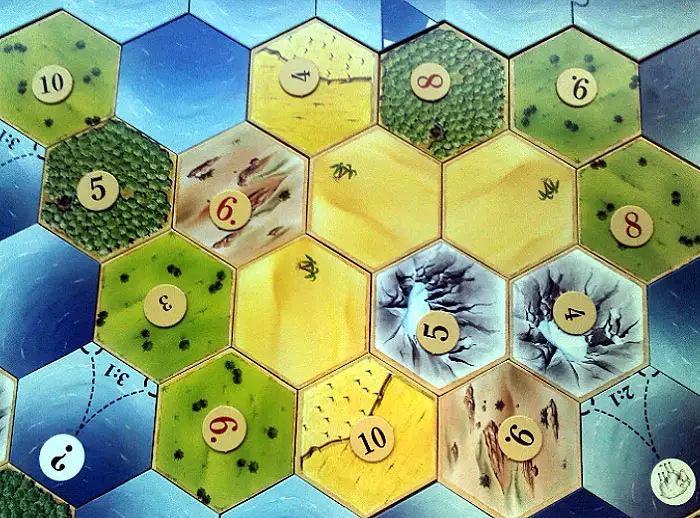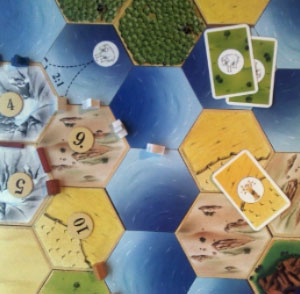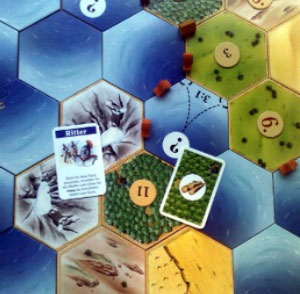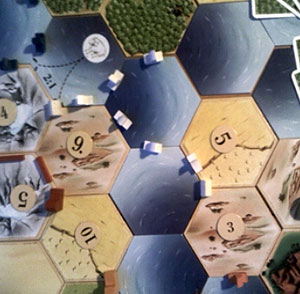Apparently "Settlers of Catan" was inspired by the settlement of Iceland. I guess this is why sheep is one of the resources. I decided to take the theme further and make a Viking Age inspired scenario for Catan.
Playtime is ca 90 minutes.

The two settlements at the beginning are placed in Iceland (main island). I used the most common numbers for Iceland, to make the game a bit quicker, the other islands do not have any numbers yet. At the beginning of the game one gets the resource of both settlements and a knight. If a number is rolled which is not on the board, the dice are rolled again. The numbers for the smaller islands are in a bag, leaving out the 2s and 12s.
The normal seafarer extension rules apply to building and moving ships and the Longest Road card. One needs 12 points to win.
Gold coins are a resource, which can be acquired on gold fields hexes or by rolling a 7. They can be exchanged like any other resource.
One can only hold 10 resource cards (not including knights/gold) and resources are not dealt to players on the hand limit.
One cannot have more than 2 development cards.
The knights are a resource now, costing one sheep, one grain and one ore (like a development card in the base game) the other development cards cost 3 gold.
Trading, raiding and settling
These are the main changes. Vikings always considered the circumtances. Sometimes they would find it more worthwhile to trade with the locals, sometimes thy would raid them and sometimes they would settle the countries they travelled to.

If one reaches a hex of one of the smaller islands with a shipping lane or a road one can start trading. One trades two (of the same) resource with one of the resource of the hex on the shipping lane (like a reversed 2 for one port).
Example: White can now trade two sheep (ore, mud, wood) for one corn.

To raid one uses a knight, takes one of the resources of the hex and blindly picks a number out of the bag. One knight raids one hex. The knights are kept and the Largest Army card used as before. As long as one has the end of ones shipping lane on the hex, one gets the resource of the hex when the number is rolled. If another players shipping lane also ends on the raided hex, this player will also get a resource when the number of the hex is rolled.
Example: Orange will always get wood when a 11 is rolled as long as it is positioned on this hex. It can still trade for ore on the hex above.

New settlements on the small islands can only be built on hexes which have numbers. Which means on intersections of two or more hexes, settlements can only be built when all the hexes on that intersection have numbers. Once a hex is settled it cannot be raided anymore.
Example: White just placed a settlement on the wheat and mud hexes. Too bad for orange, it cannot raid mud anymore.
Once the bag with the extra numbers is empty the 2s and 12s are placed on the remaining hexes and raiding is not possible anymore in this game, only settling.
Rolling a 7
What happens when one rolls a 7 depends on the dice combination:
1 and 6: Volcanic eruption
Everyone loses a sheep. The person who rolled a 7 gets one gold and determines a hex in Iceland where the volcanic eruption occurs and turns the number around. The hex will not produce any resources until another volcanic eruption occurs (like the robber) or one of the players uses 2 mud to stem the lava flow.
2 and 5: Bad weather
The person who rolled a 7 gets one gold and takes a road or a ship of another player away. The road or ship can only be taken away in and around Iceland (the ship needs to touch Iceland to be eligible to be taken away). It is not possible to build on roads or shipping lanes which are not connected to settlements or cities.
Example: Here orange had a ship taken away, which means it can neither trade for ore nor raid for wood, nor settle. If a ship is taken away from a closed shipping lane (between two settlements) it is open again and the ships can be moved.
3 and 4: Feud among Vikings
The person who rolled a 7 gets one gold and "kills" one of the other players knights. (return a played knight to the deck). Check if this effects who has the Largest Army card.
Gold free variation
The gold fields give a resource of ones choice. When a 7 is rolled one gets a resource of ones choice. Knights are mixed together with developments cards which cost one ore, one sheep and one corn.
Continue Reading


